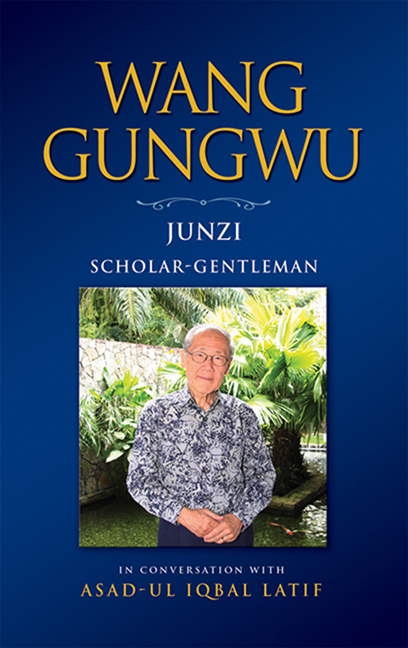Wang Gungwu: Friend, Mentor and Role Model
Published online by Cambridge University Press: 09 November 2017
Summary
I first met Wang Gungwu in 1957. He had just received his Ph.D. from the School of Oriental and African Studies of London University. He returned to Singapore and began his academic career as an Assistant Lecturer in the History Department of the University of Malaya, in Singapore. The University was located at the small and charming Bukit Timah Campus. The year 1957 was also the one in which, after many years of appeals to the British colonial government, the University of Malaya started a law department. I was one of the students in that pioneering class.
The total student population at the Bukit Timah Campus was small enough for us to know the students of other departments and faculties. Although the study of law was quite demanding, we still found the time to attend the classes in other departments and faculties. Through good friends studying history, such as Chu Tee Seng, I was told about a brilliant young history lecturer, Wang Gungwu. He had an extra appeal to those of us who were members of the University Socialist Club because he was the Club's founding president. We also admired his lovely young wife, Margaret.
I had studied history at Raffles Institution and found it boring. History lessons consisted of learning by heart, facts, dates and names. Wang Gungwu's lectures on history were entirely different. The facts, dates and names were not neglected, but the emphasis was on how to frame them into a coherent narrative. To challenge our young minds, he invited us to interpret that narrative from different points of view: the official versus the non-official, the winner versus the loser, the aggressor versus the victim, etc. In 1957, Wang Gungwu was a dashing young man, charismatic and eloquent.
The members of the University Socialist Club were very passionate about our quest to build a more democratic, just and equal world. We often invited the Club's former members, such as Wang Gungwu, Lim Hock Siew, Poh Soo Kai, Ong Pang Boon, James Puthucheary, and S Woodhull, to attend our meetings and debates. My recollection was that Gungwu was more focused on his intellectual pursuits than on the political activities of the time. He held progressive left-wing views, but was not an ideologue.
- Type
- Chapter
- Information
- Wang GungwuJunzi: Scholar-Gentleman in Conversation with Asad-ul Iqbal Latif, pp. xiii - xviiPublisher: ISEAS–Yusof Ishak InstitutePrint publication year: 2010

